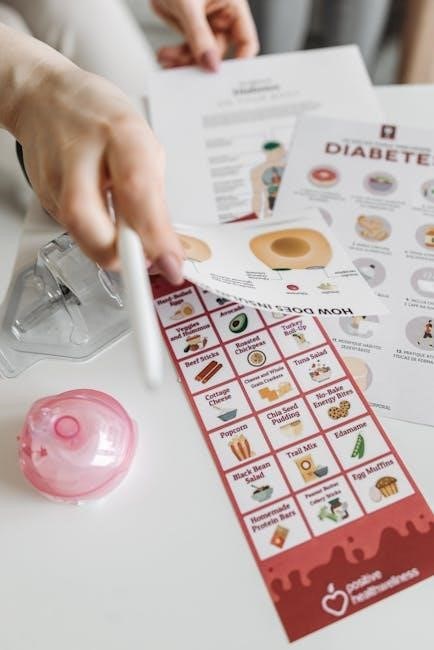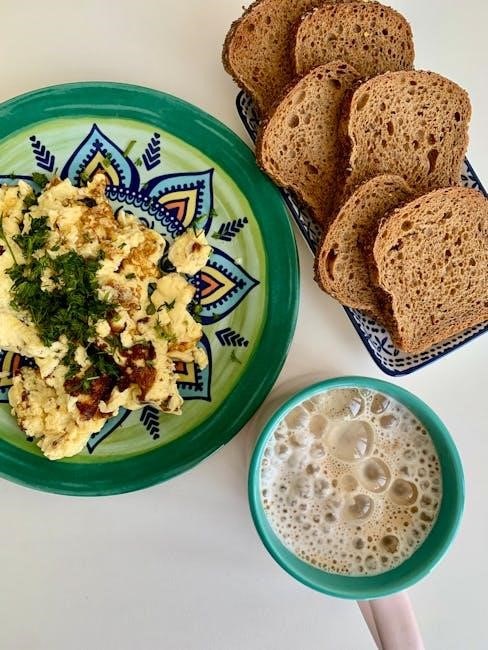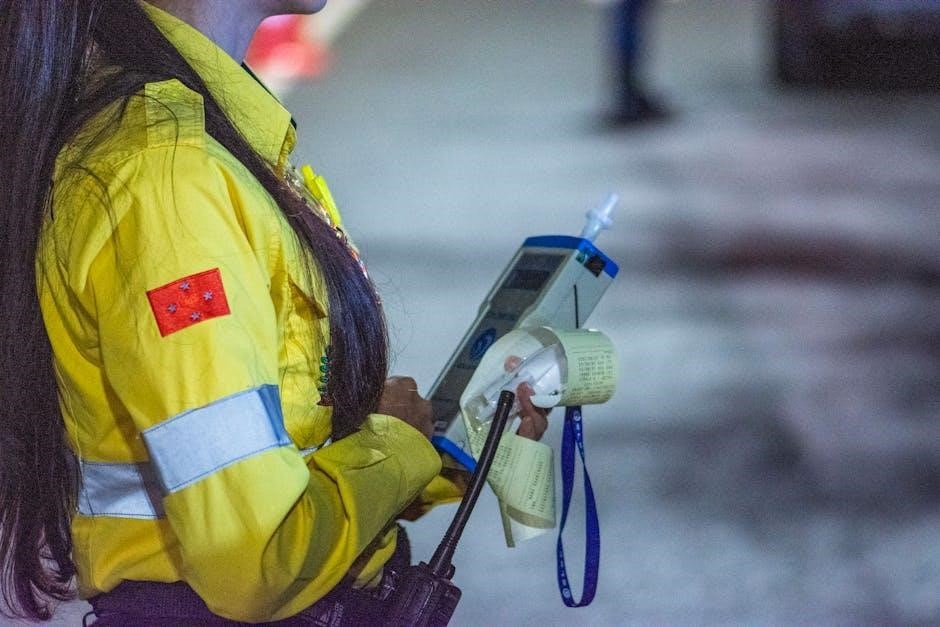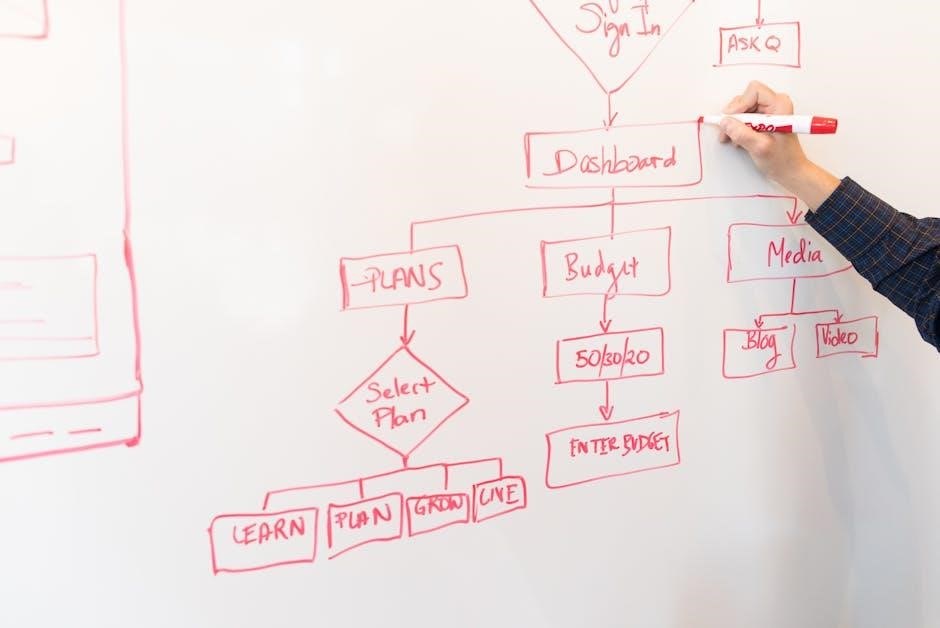Welcome to the Earthquake Versa Tiller Manual, your comprehensive guide to operating, maintaining, and troubleshooting this versatile 2-in-1 tiller and cultivator. Designed for home gardeners and professionals, this manual ensures safe and efficient use of your Earthquake Versa Tiller, covering assembly, features, and best practices for optimal performance.
1.1 Overview of the Earthquake Versa Tiller
The Earthquake Versa Tiller is a versatile, 2-in-1 garden tool designed for both tilling and cultivating. It combines a 21-inch front-tine tiller with an 11-inch cultivator, offering flexibility for various garden tasks. Its compact design and low center of gravity ensure stability, while the tool-less adjustment system allows seamless switching between modes. Built for durability, the Versa Tiller features a robust 99cc engine and high-quality construction, making it ideal for home gardeners and professionals alike.
- 2-in-1 functionality for tilling and cultivating
- Tool-less adjustments for quick mode changes
- Durable construction and powerful performance
1.2 Key Features of the Versa Tiller/Cultivator
The Earthquake Versa Tiller/Cultivator stands out with its innovative design and practical features. It offers a 99cc engine for robust power, a 21-inch tilling width, and an 11-inch cultivating width, ensuring efficient soil preparation. The tool-less adjustment system allows quick conversion between tilling and cultivating modes without additional tools. Its compact frame and low center of gravity enhance stability, while the durable construction guarantees long-lasting performance. These features make it ideal for gardeners seeking versatility and reliability in their landscaping tasks.
1.3 Importance of Reading the Manual
Reading the Earthquake Versa Tiller Manual is essential for safe and effective operation. It provides detailed instructions for assembly, maintenance, and troubleshooting, ensuring optimal performance. The manual outlines critical safety precautions to prevent accidents and explains how to handle emergencies. By understanding the controls and features, users can maximize the tiller’s functionality. Additionally, it covers warranty information and technical specifications, helping users maintain their product correctly. Following the manual’s guidelines ensures longevity of the tiller and cultivator, while also protecting the user from potential hazards. Always refer to this guide before operating the machine.

Safety Precautions and Guidelines
Always wear protective gear, ensure proper ventilation, and follow safety instructions to avoid accidents. Familiarize yourself with controls and emergency procedures before operating the tiller.
2.1 General Safety Tips for Operating the Tiller
Always wear protective gear, including gloves, safety glasses, and sturdy footwear. Ensure the area is clear of debris and obstacles. Never operate the tiller near children or pets. Avoid wearing loose clothing that could get caught in moving parts. Operate the tiller in well-ventilated areas to prevent carbon monoxide exposure. Keep hands and feet away from rotating tines. Familiarize yourself with controls and emergency shutdown procedures. Follow all safety guidelines outlined in the manual to ensure safe and efficient operation.
2.2 Pre-Operation Checks and Safety Measures
Before starting the Earthquake Versa Tiller, ensure all safety measures are in place; Always wear protective gear, including gloves, safety glasses, and sturdy footwear. Conduct a thorough inspection of the machine, checking for loose parts, damaged tines, or worn components. Ensure the area is clear of debris, children, and pets. Verify that all controls function properly and familiarize yourself with the emergency stop mechanism. Check oil levels, fuel, and ensure the tires are properly inflated. Never operate the tiller when fatigued or under the influence of alcohol. Adhere to all pre-operation guidelines outlined in the manual.
2.3 Emergency Procedures and First Aid
In case of an emergency, shut off the engine immediately and engage the brake. For any injury, provide first aid promptly. For cuts or lacerations, apply direct pressure and clean the wound. Seek medical attention if injuries are severe. If the machine overheats, turn it off and allow it to cool before inspection. Keep a first aid kit nearby. For burns, apply cool water and cover the area. Never operate the tiller when fatigued or under stress. Always prioritize safety and follow the manual’s guidelines for emergency situations to prevent further harm.
Assembly and Installation Instructions
Begin by carefully unpacking and inventorying all parts. Follow the step-by-step assembly guide in the manual, ensuring all components are securely attached. Double-check every connection and inspect the machine thoroughly before first use to ensure proper assembly and safety.
3.1 Unpacking and Inventory of Parts
Start by carefully unpacking the Earthquake Versa Tiller from its box, ensuring no components are damaged. Check for all included items, such as the tiller frame, tines, engine, shields, and control handles. Verify the presence of accessories like the spark plug wrench, oil can, and instruction manual. Inspect each part for visible damage or defects. Compare the unpacked items with the parts list in the manual to confirm completeness. Organize smaller components, such as bolts and screws, in a container to prevent loss. This step ensures a smooth assembly process and helps identify any missing or damaged parts early on.
3.2 Step-by-Step Assembly Process
Begin by attaching the handlebars to the tiller frame using the provided bolts and Allen wrench. Ensure all connections are secure and tightened properly. Next, install the tines by aligning them with the frame’s mounting points and securing them with the included hardware. Attach the protective shields to prevent debris from flying during operation. Mount the engine onto the frame, connecting the throttle and choke cables according to the manual’s instructions. Finally, perform a thorough inspection to ensure all parts are correctly aligned and securely fastened. Refer to the diagrams for precise alignment and tightening specifications.
3.3 Final Inspection Before First Use
Before operating your Earthquake Versa Tiller, perform a final inspection to ensure all components are properly assembled and functioning. Check that all bolts and connections are tightened securely and that no parts are loose. Verify the engine oil level and ensure it meets the recommended specifications. Inspect the tines and shields for proper alignment and damage. Test the control cables to confirm smooth operation of the throttle and choke. Inflate the tires to the recommended pressure and ensure all safety features are intact. Finally, conduct a brief test run on a flat surface to ensure the tiller operates smoothly and evenly.
Operating the Earthquake Versa Tiller
Mastering the Earthquake Versa Tiller involves understanding its controls, starting procedures, and mode adjustments. This section covers engine operation, tiller-to-cultivator conversion, and performance optimization for effortless gardening tasks.
4.1 Starting the Engine and Basic Controls
Starting the Earthquake Versa Tiller engine involves pulling the starter rope gently while ensuring the choke is engaged. Prime the engine by pressing the primer bulb 2-3 times. Once running, adjust the choke to the “run” position. The throttle lever controls engine speed, and the gear lever selects forward or reverse motion. Always ensure the area is clear of debris before starting. Familiarize yourself with the controls to ensure smooth operation. For detailed steps, refer to the engine manual section in this guide.
4.2 Switching Between Tiller and Cultivator Modes
The Earthquake Versa Tiller allows seamless switching between tiller and cultivator modes without tools. To convert from tiller to cultivator, remove the outer tines and shields using the tool-less adjustment system. Ensure the machine is on level ground and the engine is off before making adjustments. Once converted, the cultivator mode is ideal for smaller areas and soil preparation. Always check the tine engagement and shield alignment before resuming operation. This dual functionality makes the Versa Tiller versatile for various gardening tasks, enhancing efficiency and convenience for users.
4.3 Adjusting the Tiller for Optimal Performance
To optimize the Earthquake Versa Tiller’s performance, adjust the tine depth and shield alignment based on soil conditions. Use the tool-less adjustment system to modify tine engagement for deeper tillage or shallow cultivation. Ensure the tines are securely locked in place after adjustments. Check the engine throttle and gear settings to match your workload. Regularly inspect and clean the tines and shields to prevent debris buildup. Proper alignment and maintenance ensure efficient soil turnover and extended machine longevity, making your gardening tasks easier and more productive.
Maintenance and Care Instructions
Regularly inspect and clean the tiller, ensuring all moving parts are well-lubricated. Follow the maintenance schedule for oil changes and blade sharpening. Store the tiller in a dry, protected area during off-seasons to prevent rust and damage, ensuring longevity and optimal performance.
5.1 Regular Maintenance Schedule
Adhere to the recommended maintenance schedule to ensure your Earthquake Versa Tiller operates efficiently. Check oil levels before each use and change the engine oil every 25 hours of operation. Sharpen the tines quarterly and lubricate pivot points monthly. Inspect air filters and spark plugs seasonally, replacing them as needed. Clean the machine thoroughly after each use to prevent debris buildup. Store the tiller in a dry, well-ventilated area during winter months, following the winterization steps outlined in the manual. Regular maintenance extends the lifespan and performance of your tiller.
5.2 Cleaning and Lubrication Tips
Regular cleaning and lubrication are essential for maintaining your Earthquake Versa Tiller. After each use, clean the tines and shields with a wire brush to remove dirt and debris. Wipe down the engine and handles with a damp cloth. Lubricate pivot points, gears, and cables monthly using high-quality grease or oil. Apply a rust-inhibiting coating to metal parts during storage. Avoid using harsh chemicals, as they may damage components. Proper cleaning and lubrication ensure smooth operation, prevent corrosion, and extend the lifespan of your tiller.
5.3 Storage and Winterization Procedures
Proper storage and winterization are crucial for maintaining your Earthquake Versa Tiller. After the gardening season, clean the tiller thoroughly, removing dirt and debris. Drain the fuel tank or stabilize the fuel with an additive to prevent spoilage. Apply a rust-inhibiting coating to metal parts and lubricate moving components. Store the tiller in a dry, protected area away from direct sunlight and moisture. Cover it with a durable tarp or storage cover to shield it from dust and pests. Regular winterization ensures your tiller remains ready for the next growing season.
Troubleshooting Common Issues
Troubleshooting common issues with your Earthquake Versa Tiller involves diagnosing engine problems, addressing tine adjustments, and resolving performance declines. Refer to the manual for detailed solutions and maintenance tips.
6.1 Diagnosing Engine Problems
Diagnosing engine problems in your Earthquake Versa Tiller involves checking for common issues like failure to start, rough operation, or overheating. First, ensure the air filter is clean and the fuel tank is full. If the engine stalls, inspect the spark plug for fouling or wear. Check the fuel line for blockages or leaks. Refer to the engine manual for specific troubleshooting steps. If issues persist, consult the technical specifications or contact customer support for assistance. Regular maintenance, as outlined in the manual, can prevent many engine-related problems and ensure optimal performance.
6.2 Resolving Tine and Shield Adjustments
Adjusting the tines and shields on your Earthquake Versa Tiller is crucial for optimal performance. If the tines are clogged with debris, clean them thoroughly. For proper alignment, ensure the tines are evenly spaced and securely tightened. Shields should be adjusted to prevent soil from being thrown too far. Refer to the manual for tool-less adjustment instructions, a unique feature of the Versa Tiller. If issues persist, inspect for worn or damaged parts and replace them as needed. Proper adjustments ensure efficient tilling and cultivator functionality, maintaining your garden’s health and productivity.
6.3 Addressing Performance Decline
If your Earthquake Versa Tiller experiences a decline in performance, start by checking the engine for proper function and ensuring the oil level is adequate. Clean or replace the air filter if dirty, as this can restrict airflow and reduce power. Inspect the tines for clogging or damage and clean or replace them as needed. Additionally, ensure the tiller is properly lubricated and that all moving parts are free from debris. If issues persist, consult the engine manual or contact customer support for further assistance. Regular maintenance can help prevent performance decline and extend the life of your tiller.
Technical Specifications and Warranty Information
- Engine: 79cc or 99cc depending on the model.
- Warranty: 5-year limited warranty for residential use.
- Tine types: Front-tine design for versatile tilling.
- Weight and dimensions vary by model for easy handling.
7.1 Engine and Tiller Specifications
The Earthquake Versa Tiller is equipped with a reliable 79cc or 99cc 4-cycle engine, delivering ample power for tilling and cultivating. The tiller features a front-tine design with a 21-inch tilling width and an 11-inch cultivating width. It weighs approximately 90 pounds, making it portable yet sturdy. The tiller is built with durable steel components, ensuring long-term performance. Key specifications include a loop-and-handlebar design for easy maneuverability and a tool-less conversion system between tiller and cultivator modes. These specifications ensure the Versa Tiller is both efficient and user-friendly for various gardening tasks.
7.2 Warranty Coverage and Terms
The Earthquake Versa Tiller is backed by a 5-year limited warranty, covering defects in materials and workmanship. This warranty applies to the original purchaser and is non-transferable. It includes parts and labor for repairs performed by authorized service centers. Proper maintenance, as outlined in the manual, is required to maintain warranty validity. The warranty does not cover damage caused by misuse, neglect, or normal wear and tear. For detailed warranty terms and conditions, refer to the manual or contact Earthquake customer support directly.
7.4 Contacting Customer Support
For assistance with your Earthquake Versa Tiller, contact customer support via phone, email, or through the official website. Visit the Earthquake website for contact details and a support portal. Phone support is available during business hours, Monday through Friday. Have your model number ready for efficient service. Email inquiries are typically responded to within 24-48 hours. Additionally, refer to the manual or website for troubleshooting guides and FAQs. Ensure to contact authorized support channels for genuine assistance and parts. Prepare your serial number and detailed issue description for quicker resolution.

Unique Features of the Earthquake Versa Tiller
The Earthquake Versa Tiller stands out with its tool-less adjustment system, enabling quick mode switches between tilling and cultivating. Its compact, portable design enhances maneuverability and storage ease, making it ideal for various gardening tasks. Durable construction ensures long-lasting performance, while the low center of gravity improves stability and control during operation. These features combine to deliver a versatile, efficient, and user-friendly gardening tool for both small and large-scale projects.
8.1 Tool-Less Adjustment System
The Earthquake Versa Tiller features a revolutionary tool-less adjustment system, allowing users to switch between tilling and cultivating modes in seconds. This innovative design eliminates the need for additional tools, making transitions seamless and efficient. The system is designed for durability, ensuring consistent performance over time. With this feature, gardeners can adapt their workflow effortlessly, tackling various tasks without interruption. The tool-less adjustment enhances versatility, making the Versa Tiller ideal for both small-scale gardening and larger projects. Its user-friendly mechanism ensures ease of operation, catering to both novice and experienced users alike.
8.2 Compact Design and Portability
The Earthquake Versa Tiller boasts a compact design, making it highly portable and easy to maneuver in tight spaces. Its lightweight frame and low center of gravity ensure stability while allowing for effortless transport between gardening areas. The tiller’s streamlined construction enables smooth operation in small gardens or large plots alike. Additionally, its foldable handle and compact footprint simplify storage, saving space in sheds or garages. This portability, combined with its powerful performance, makes the Versa Tiller an ideal choice for gardeners seeking efficiency and convenience without compromising on capability.
8.3 Durable Construction and Build Quality
The Earthquake Versa Tiller is built with high-quality materials and robust construction, ensuring long-lasting performance. Its heavy-duty steel frame and durable tines are designed to withstand rigorous use in various soil conditions. The tiller’s compact design and reinforced components contribute to its stability and reliability. Additionally, the tool-less adjustment system is engineered for durability, allowing for quick and easy transitions between tiller and cultivator modes. With a 5-year warranty, the Versa Tiller demonstrates Earthquake’s commitment to producing reliable and hard-wearing gardening equipment for years of dependable service.
Accessories and Optional Parts
Explore recommended accessories like additional tines, cultivator shields, and storage bags to enhance your Earthquake Versa Tiller’s functionality. Optional parts are available for specialized gardening needs.
9.1 Recommended Accessories for Enhanced Functionality
To maximize the performance of your Earthquake Versa Tiller, consider these recommended accessories. Additional tine sets and cultivator shields can expand your tiller’s capabilities, while a storage bag helps keep parts organized. An oil bottle for maintenance ensures your engine stays lubricated. For convenience, a manual parts bag is available for easy access to components. These accessories are designed to optimize your gardening experience and extend the life of your tiller. Refer to the illustrated parts breakdown for details on compatibility and installation. Always consult the official parts catalog or contact customer support for genuine accessories.
9.2 Ordering Replacement Parts
For the Earthquake Versa Tiller, ordering replacement parts is straightforward. Always reference your tiller’s model number and the illustrated parts breakdown in the manual to ensure accuracy. Genuine parts can be purchased directly from authorized Earthquake dealers or through the official online catalog. Contact customer support for assistance with part identification or to confirm compatibility. Be sure to provide the exact model number (e.g., 20015 or 25780) to avoid errors. This ensures you receive the correct components for your specific tiller, maintaining performance and longevity.
9.3 Installing Optional Attachments
Installing optional attachments on your Earthquake Versa Tiller enhances its functionality. Always consult the manual for specific instructions, as procedures may vary by attachment type. Ensure compatibility by verifying the part number with your tiller’s model (e.g., 20015 or 25780). Use the provided hardware and follow step-by-step guidelines to secure the attachment properly. After installation, test the attachment under low-load conditions to ensure correct operation. For complex installations, contact Earthquake customer support for assistance. Proper installation ensures safety and optimal performance while maintaining your tiller’s warranty coverage.

Environmental Considerations and Best Practices
Adopt eco-friendly practices by using the tiller efficiently, disposing of waste properly, and reducing fuel consumption. Regular maintenance supports best environmental practices.
10.1 Eco-Friendly Operation Tips
Operate your Earthquake Versa Tiller sustainably by using bio-friendly oils and minimizing fuel consumption. Regular tune-ups reduce emissions and optimize performance. Always follow proper disposal methods for waste materials. Consider using the tiller during cooler parts of the day to reduce environmental impact. Proper storage and winterization prevent leaks and contamination. By adhering to these eco-friendly practices, you contribute to a greener environment while maintaining your garden efficiently.
Additionally, ensure the machine is turned off when not in use to avoid unnecessary emissions. Regularly check and maintain air filters to improve fuel efficiency, reducing overall carbon output.
10.2 Proper Disposal of Waste Materials
Dispose of waste materials from your Earthquake Versa Tiller responsibly. Separate recyclable parts, such as metal and plastic, from non-recyclable waste. Safely drain and dispose of oils, fuels, and coolants according to local regulations. Batteries and hazardous materials require special handling to prevent environmental harm. Always consult local waste management guidelines for proper disposal methods. Participate in community recycling programs to ensure eco-friendly practices. Remember to clean and drain all fluids before disposing of any parts. Proper disposal protects the environment and adheres to legal standards.
Additionally, check for local facilities that accept machinery waste for responsible recycling.
10.3 Reducing Carbon Footprint
Minimize your environmental impact by adopting eco-friendly practices while using the Earthquake Versa Tiller. Regularly maintain the engine to ensure optimal fuel efficiency, reducing emissions. Use the recommended fuel type to avoid excessive consumption. Store the tiller properly, especially during winter, to prevent unnecessary fuel evaporation. Opt for eco-conscious gardening practices, such as tilling only when necessary and avoiding redundant passes. Utilize the tool-less adjustments to optimize performance and reduce energy waste. By following these guidelines, you contribute to a more sustainable gardening experience while lowering your carbon footprint.
Additionally, consider recycling or responsibly disposing of old parts to further reduce environmental impact.

User Reviews and Feedback
The Earthquake Versa Tiller receives positive feedback for its tool-less adjustments and 2-in-1 functionality. Users praise its ease of use, versatility, and durability. Some note assembly challenges, but overall, it’s a reliable and efficient gardening tool.
11.1 Common Praise and Positive Experiences
Users consistently praise the Earthquake Versa Tiller for its exceptional versatility and ease of use. The tool-less adjustment feature is frequently highlighted as a major advantage, allowing seamless switching between tilling and cultivating modes. Many gardeners appreciate its compact design, which enhances portability and storage. The robust 99cc engine and durable construction receive high marks for reliability and performance. Overall, the Versa Tiller is celebrated for its efficiency and value, making it a favorite among both amateur and experienced gardeners aiming to achieve professional results in their gardens.
11.2 Addressing Common Complaints
While the Earthquake Versa Tiller is widely praised, some users have noted challenges with assembly complexity and initial engine performance. A few report difficulties with tine adjustments and shield alignment. To address these, ensure proper assembly by following the manual step-by-step. For engine issues, refer to the troubleshooting section and maintain regular oil changes. Tine adjustments can be simplified by consulting the illustrated parts breakdown. Overall, most issues are resolved with careful adherence to the manual and routine maintenance, ensuring optimal performance and longevity of the tiller.
11.3 User Tips and Tricks
Experienced users recommend starting with shallow passes to loosen soil gradually, especially in hard or rocky areas. Regularly clean debris from tines and shields to maintain efficiency. For better control, adjust handlebars to your height. Utilize the tool-less adjustment feature to switch modes quickly. Store the tiller in a dry, protected area during off-seasons. Apply lubrication to moving parts periodically and check oil levels before each use. These practices enhance performance and extend the product’s lifespan. Always follow safety guidelines for optimal results and machine longevity.
Illustrated Parts Breakdown
This section provides detailed diagrams of the Earthquake Versa Tiller’s components, including tines, shields, and engine parts, to help users identify and maintain each part effectively.
12.1 Detailed Diagram of the Tiller Components
This section provides a detailed visual guide to the Earthquake Versa Tiller’s components, including the tines, shields, and engine. Each part is clearly labeled and illustrated to help users identify and locate components for maintenance or repair. The diagrams show how the tiller and cultivator modes are structured, highlighting the tool-less adjustment system and compact design. These visuals are crucial for understanding the assembly and ensuring proper functionality. By referencing these diagrams, users can easily identify parts that may need replacement or adjustment, simplifying the maintenance process and extending the product’s lifespan.
12.2 Understanding the Cultivator Parts
This section provides a detailed explanation of the cultivator components on the Earthquake Versa Tiller. The cultivator mode is designed for shallow soil preparation and weeding, with adjustable shields and tines that can be easily removed or reconfigured. The diagram highlights the 11-inch cultivator tines, shields, and handlebar controls, explaining their roles in soil preparation. By understanding these parts, users can optimize the cultivator’s performance for specific gardening tasks. The visual guide ensures clarity, helping users identify and maintain each component for efficient operation and longevity of the machine.
12.3 Reference Guide for Maintenance
This section serves as a quick reference for maintaining your Earthquake Versa Tiller. Regular lubrication of moving parts, such as tines and gears, is essential for smooth operation. Inspect and replace worn or damaged components promptly. Follow the recommended maintenance schedule in the manual for tasks like oil changes and blade sharpening. Proper storage in a dry, protected area during off-seasons ensures longevity. Refer to the detailed diagrams for part identification and maintenance procedures. By adhering to these guidelines, you can extend the life of your tiller and ensure optimal performance.


































































